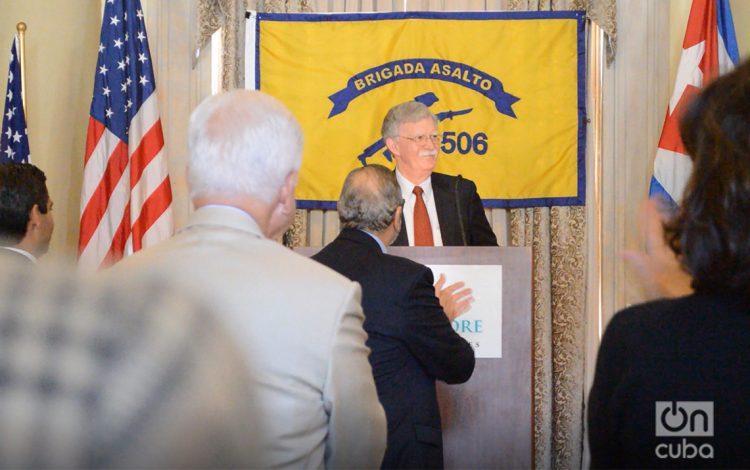If you didn’t know John Bolton and you heard him speak last week in Coral Gables before the Bay of Pigs veterans, you would be forgiven if you thought you were hearing a campaigning politician as opposed to the national security advisor to the President of the United States.
Bolton discussed some consequential measures (some announced hours before in Washington), but he was in Miami to rally emotions. He spared no twist of rhetoric, from “troika of tyranny” to “three stooges of socialism.” He felt compelled to criticize President Obama 14 times by name, even though it had been 453 days since Obama had anything to do with policy toward Cuba or any other place. He implored his audience’s help in rejecting socialism “in this hemisphere and in this country,” as if a red tide were upon us.
But Bolton was meek when it came to his most critical point: regime change in Caracas, Havana, and Managua. For all his extravagant rhetoric, he avoided any clear expression of President Trump’s commitment to achieve such an end.
Instead, Bolton’s Coral Gables doctrine is about economic sanctions that he hopes will work if they are draconian enough and applied long enough.
But even among Bolton fans there is doubt, a tacit recognition that he has given President Trump a set of tactics that draw applause and a strategy that seems to be, “We’ll see what happens.”
Hence we see many among Venezuela’s opposition, including the dislodged Supreme Court that operates outside the country, calling for military action to oust Maduro. Or Senator Rick Scott of Florida calling for the White House to consider sending troops to deliver aid to Venezuela – as if the 82nd Airborne were Uber Eats, and as if such an action could possibly be conflict-free.
Or Nicaraguan democrat Humberto Belli warning that President Trump risks making the United States look like a “paper tiger.”
Or essayist Carlos Alberto Montaner urging Washington not to “torment Cuban society with more hardships” if it is not willing to use military force (with NATO and Latin American nations readily joining U.S. troops, he dreams) by the end of next year.
Sadly for these men, the cavalry is not coming. The sanctions are the policy. President Trump does not like military adventures, and he recently told Congress that “foolish wars” would threaten the nation’s prosperity.
What Trump has done is to allow Bolton to use sanctions – those announced, and more to come, he assures us – instead of military force to bring about political change. It’s fine with Trump because no American blood or treasure are at risk. Few object, at least yet, to a policy that targets civilians by harming the economies in which they live.
The effect in Cuba will be to add to the troubles that were growing already due to Venezuela’s self-inflicted economic decline. New measures to disrupt Venezuela’s oil trade, and its supplies to Cuba, will worsen conditions in an economy where scheduled blackouts are already beginning.
New Cuba travel restrictions will be issued in the coming months. Their shape and precise impact is unknown, but at the margin they will reduce the state’s tourism income – and also that of families in Cuba’s hotel and tourism sector, including the entrepreneurs whose lodging, transportation, restaurant, and other services benefit from U.S. customers.
New restrictions on remittances will create inconvenience but are unlikely to stop those who want to send money to relatives and friends. They may disrupt the use of money transfer services as a means to send payments to private businesses in Cuba – a use that was not contemplated when Western Union and other companies entered the business decades ago.
The activation of Title III of the Helms-Burton law will unleash lawsuits against investors in Cuba, potentially including U.S. companies. Other sanctions will deny visas to executives and directors of companies whose investments are tied to expropriated property. Washington, in other words, will be punishing foreign companies for doing precisely what U.S. companies do all around the world.
Measures such as these are unlikely to cause current investors to leave Cuba, but they will deter some new investment and open the way for investors who have no connection to the United States and no interest in following rules that Washington establishes for the world to follow.
Two things are predictable as economic conditions worsen in Cuba and Venezuela. Those governments will dig in as if their survival is at stake, because it is. And relations between the United States and its allies will worsen, because while many would like to see Maduro go, they did not sign up to Bolton’s strategy of slow economic strangulation to achieve that end.
As refugee flows worsen, diplomacy – the kind that involves both sticks and carrots – will become more urgent for Latin America and Europe. A coalition will still be in place to conduct it, but the United States may find itself alone and on the outside.
Bolton will then have accomplished a 21st century Bay of Pigs: a momentary play on the emotions of Cuban Americans, and a strategy where rhetoric matters most and added economic hardship is the sole measurable result.










